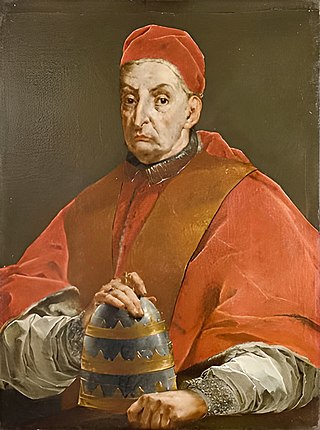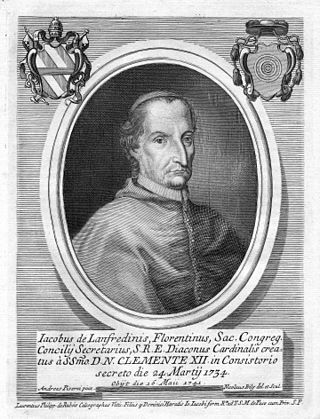Benedict XIII may refer to:

Pope Benedict XIII, born Pietro Francesco Orsini and later called Vincenzo Maria Orsini, was head of the Catholic Church and ruler of the Papal States from 29 May 1724 to his death in February 1730.

Pope Benedict XIV, born Prospero Lorenzo Lambertini, was head of the Catholic Church and ruler of the Papal States from 17 August 1740 to his death in May 1758.

Pope Clement XII, born Lorenzo Corsini, was head of the Catholic Church and ruler of the Papal States from 12 July 1730 to his death in February 1740.

Pope Gregory XII, born Angelo Corraro, Corario, or Correr, was head of the Catholic Church from 30 November 1406 to 4 July 1415. Reigning during the Western Schism, he was opposed by the Avignon claimant Benedict XIII and the Pisan claimants Alexander V and John XXIII. Gregory XII wanted to unify the Church and voluntarily resigned in 1415 to end the schism.

1730 (MDCCXXX) was a common year starting on Sunday of the Gregorian calendar and a common year starting on Thursday of the Julian calendar, the 1730th year of the Common Era (CE) and Anno Domini (AD) designations, the 730th year of the 2nd millennium, the 30th year of the 18th century, and the 1st year of the 1730s decade. As of the start of 1730, the Gregorian calendar was 11 days ahead of the Julian calendar, which remained in localized use until 1923.
Benedict may refer to:
Benedict has been the papal name of fifteen Roman Catholic popes. The name is derived from the Latin benedictus, meaning "blessed".
Papal coats of arms are the personal coat of arms of popes of the Catholic Church. These have been a tradition since the Late Middle Ages, and has displayed his own, initially that of his family, and thus not unique to himself alone, but in some cases composed by him with symbols referring to his past or his aspirations. This personal coat of arms coexists with that of the Holy See.
There have been fourteen popes named Clement.

Niccolò Coscia was an Italian Roman Catholic cardinal.
Ubi primum may refer to :
Pietro Orsini may refer to:

The 1740 papal conclave, convoked after the death of Pope Clement XII on 6 February 1740, was one of the longest conclaves since the 13th century.

The 1730 papal conclave elected Pope Clement XII as the successor to Pope Benedict XIII.
Benedict is a masculine given name of Latin origin, meaning "blessed". Etymologically, it is derived from the Latin words bene ('good') and dicte ('speak'), i.e. "well spoken". The name was borne by Saint Benedict of Nursia (480–547), often called the founder of Western Christian monasticism.

Agustín Pipia (1660–1730) was the Master of the Order of Preachers from 1721 to 1725.
Cardinal Orsini may refer to:
Cardinal Conti may refer to:

Giacomo Lanfredini was a Roman Catholic cardinal who served as Cardinal-Deacon of Santa Maria in Portico (1734–1741) and Bishop of Osimo e Cingoli (1734–1740).

Innico Caracciolo di Martina or Innico Caracciolo the Younger was an Italian cardinal.